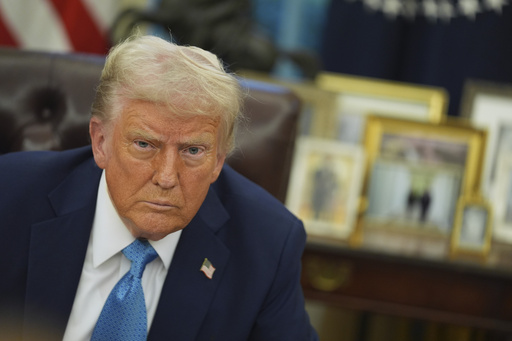
BOSTON — In a significant development, a second federal judge issued a temporary injunction on Friday against the Trump administration’s attempts to suspend federal funding, adding to the ongoing debate surrounding the allocation of trillions of dollars in grants and loans.
Judge John McConnell ruled in favor of nearly twenty states that sought an emergency court order to prevent federal agencies from halting funding. Earlier in the week, another judge in Washington had already blocked the plan just minutes before it was set to be implemented; however, her ruling is only effective until Monday unless she opts for an extension.
In his ruling, McConnell directed the federal government not to “pause, freeze, impede, block, cancel, or terminate” any funding promised to the states while the restraining order is in effect. He remarked that the court had to act early in the litigation considering the significant scope and vagueness of the Executive’s actions, which hindered any other course of action.
Several states involved in the lawsuit expressed their approval of the court’s decision. Massachusetts Attorney General Andrea Campbell stated, “Today’s court decision reaffirms that the President cannot unilaterally take away federal funding, especially resources that our kids, seniors and economy rely on. His reckless actions unleashed chaos and confusion yet demonstrated the enormous power of attorneys general to fight back.” She committed to continue protecting Massachusetts residents against what she characterized as significant and unlawful power abuses.
Rhode Island Attorney General Neronha also conveyed his appreciation for McConnell’s acknowledgment of the “irreparable harm” that would ensue from the funding freeze directive. He asserted that the federal funding pause aimed to instill fear and chaos, which had indeed been effective. Neronha emphasized that such tactics would not deplete their resolve, as every legal victory would reinforce their stance against these illicit disruptions.
The federal government opposed the restraining order, claiming that there was no foundation for what they referred to as “sweeping relief.” McConnell, appointed by former President Barack Obama and based in Rhode Island, delivered his ruling even after the Office of Management and Budget (OMB) retracted a memo that detailed an extensive pause on federal loans and grants. He noted that the stated recession was merely “in name-only,” concluding that his order remained necessary.
The White House had indicated that a freeze on funding would still be pursued, aligning with President Donald Trump’s series of executive orders aimed at increasing fossil fuel production, eliminating protections for transgender individuals, and ceasing efforts related to diversity, equity, and inclusion.
The OMB’s memo, released earlier that week, alarmed numerous states, schools, and organizations dependent on federal funds. Administration officials justified the pause as a necessary measure to evaluate whether spending aligned with Trump’s executive directives regarding climate change and diversity, equity, and inclusion. However, just two days later, the administration issued a brief notice rescinding the original memo.
Subsequently, Trump administration officials assured that crucial assistance programs for Americans—such as Medicare, Social Security, student loans, and food stamps—would remain unaffected, but this did little to alleviate the confusion. They maintained that their actions successfully underscored the obligations of federal agencies to abide by Trump’s orders, prompting states to pursue the temporary restraining order.
In their legal motion, Trump’s Justice Department contended that the federal court did not possess jurisdiction and that the states could not utilize a ruling originally aimed at the OMB memo to challenge broader aspects of Trump’s executive orders. They also emphasized that the President and the OMB clearly held the authority to direct agencies in executing the President’s agenda within the parameters of each agency’s statutory authority.
Brett Shumate, the acting assistant attorney general, affirmed that the President’s power to direct subordinate agencies aligns with established legal precedent. There was no immediate response from the Trump administration regarding the order. The judges’ ruling favoring the states had been anticipated, as McConnell had previously indicated sympathy toward the states’ concerns about the potential ramifications of a federal funding freeze during a Wednesday hearing.

